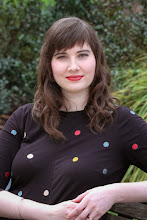About Me

- Rachel E. Watson
- I think, read and write. I might review books, mull on music, spin original poems, share insights or tell stories, but you can be sure whatever you read here comes from a thoughtful and considered place within.
Popular Posts
-
Anne Shirley and Gilbert Blythe. For women of my generation, before we were old enough to even know ourselves, there was the love st...
-
Social Media Blues By Rachel Watson I’ve got a deadline. A project due in less than a week. I open my blan...
-
This is the sheet music to Rachmaninoff's "Vespers, Op. 37." This post is about a beautiful kind of classical music I re...
Blog Archive
-
▼
2014
(57)
-
▼
August
(13)
- 10 Books I Pretend to Have Read
- 10 Influential Books for this Young Writer
- Brandi and Beer: Drinking It in at the Microbrew &...
- Why Writing Can't Make You Dumber
- What I Observed from a Traffic Violation
- How You Can Know What You're Good At
- Musings on the Topknot
- Why I Kept My Last Name: A Christian Cultural Pers...
- The Difference between Shyness and Introversion
- Hey Squid! Can't Get You out of My Head
- Handwritten Blog Post Challenge
- Book Review: "Servants: A Downstairs History of Br...
- Lessons from the Maple and the Ant
-
▼
August
(13)


















